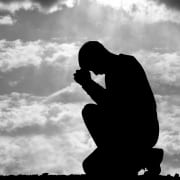“One thing I do know, that though I was blind, now I see.”
— John [9:25]
GAINING OUR SIGHT THROUGH JESUS
The backstory for John [9:25] reveals a person who was blind from birth, whom Jesus heals. The man is begging on the side of the road when Jesus sees him. The disciples ask Jesus if the beggar is blind because he was sinful, or were his parents sinful? Here Jesus begins his lesson.
They met the blind beggar on the Sabbath. To begin this lesson Jesus picks up mud and rubs it on the eyes of the blind man and tells him, “Go, wash in the pool of Siloam.” (John 9:7). The man goes to the Siloam pool, which was just outside the city of Jerusalem. (The pool was recently rediscovered in 2004 by workers working on the underground plumbing systems of the city.) After washing, the man can see, and he returns to his community, the members of which see the change in him. They are extraordinarily doubtful, wondering among themselves if this could be real, or was it someone else they were meeting that looked like the blind man? Ironically, this same doubt occurs frequently even today with those who are spiritually reborn. Their neighbors and friends, stuck in the past, wonder how the person could have been saved. They are not willing to completely commit to the person’s transformation.
After a long period of questioning, the people of his community ask the formerly blind man where Jesus is now, and the man answers, “I do not know.” (John [9:12]) The crowd brings the man to the Pharisees, who also doubt and ask numerous questions. The Pharisees strangely focus on the fact that the healing occurred on the Sabbath, a clear sign to them that Jesus was a sinner. In the minds of the Pharisees this was the path to follow in determining the authenticity of the healing.
The Pharisees then question the man’s parents, who confirm that he was blind at birth. Not wanting to risk their status within the community, they avoid expressing any opinion about their son’s healing and tell the Pharisees to talk to him directly. The Pharisees visit the formerly blind man a second time and question him more aggressively. Trying to force the man to acknowledge that God healed him and not Jesus, they say to him, “Give glory to God! We know this man is a sinner.” (John [9:24]). Still stuck on the fact that the healing was done on the Sabbath, the Pharisees are more interested in discrediting Jesus than in understanding the healing. The man replies, “I do not know whether he is a sinner. One thing I do know, that though I was blind, now I see.” (John [9:25])
Frustrated the blind man says, “Here is an astonishing thing! You do not know where he comes from, and yet he opened my eyes. We know that God does not listen to sinners, but he does listen to one who worships him and obeys his will. Never since the world began has it been heard that anyone opened the eyes of a person born blind. If this man were not from God, he could do nothing.” (John [9:30]–33)
Unwilling to accept this rebuke from the saved blind man, the Pharisees drive him out of his community. Imagine how we would feel, if suddenly we were physically or spiritually healed and then we were subjected to this kind of doubt and questioning. The blind man, after a lifetime of being blind, no doubt imagined that those that surrounded him would be overjoyed at his sudden regaining of sight. We readers of this story can easily sympathize with the blind man and wonder why the Pharisees or his community could not come to terms with the fact that Jesus healed the man.
For those who were blind and now see, this is a common issue. Many will not believe that the supernatural change and healing in them came from an honorable cause. There must be some trick to it, more than just a change of heart or a healing. With Jesus that is all there is. As the blind beggar said so simply when asked how he was healed, “I do not know whether he is a sinner. One thing I do know, that though I was blind, now I see.”
Blessings, until next time,
Bruce L. Hartman










